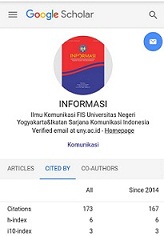Incidental news exposure and opinion leader's role in spreading climate change information and environment-friendly behavior on social media
DOI:
https://doi.org/10.21831/informasi.v53i1.62632Keywords:
incidental news, opinion leaders, diffusion of innovation, social media, climate changeAbstract
Social media is the primary medium for disseminating information, including global topics such as climate change. The topic of climate change is related to the community's application of environmentally friendly habits. Social media and social media users have their characteristics in disseminating information about climate change compared to other media. Social media allows a user to be accidentally exposed to the information referred to as incidental news exposure. In addition, in disseminating information, opinion leaders have a role in disseminating information to social media users. This study aims to determine the role of opinion leaders and incidental news exposure in disseminating information about climate change. This research is a case study involving fourteen participants divided into two Focused-Group Discussion (FGD) groups. After carrying out the FGD, the results of the participants' discussions were analyzed using the diffusion of innovation theory, in which there are elements of the spread of an innovation consisting of the innovation, communication channel, time, and social system. The study results show that incidental news exposure and opinion leaders play a role in disseminating information about climate change and environmentally friendly habits. Incidental news exposure and opinion leaders can be part of disseminating information with the diffusion of innovation theory approach.
References
Ahmed, S., & Gil-Lopez, T. (2022). Incidental news exposure on social media and political participation gaps: Unraveling the role of education and social networks. Telematics and Informatics, 68(December 2021), 101764. https://doi.org/10.1016/j.tele.2021.101764
Bergstrí¶m, A., & Jervelycke Belfrage, M. (2018). News in Social Media: Incidental consumption and the role of opinion leaders. Digital Journalism, 6(5), 583–598. https://doi.org/10.1080/21670811.2018.1423625
Bimo, A., & Safrina, R. (2021). The Power of Social Media to Fight Climate Change. ASEAN Climate Change and Enegry Project. https://accept.aseanenergy.org/the-power-of-social-media-to-fight-climate-change/
BMKG. (2023). Ekstrem Perubahan Iklim | BMKG. Bmkg. https://www.bmkg.go.id/iklim/?p=ekstrem-perubahan-iklim
Boczkowski, P. J., Mitchelstein, E., & Matassi, M. (2018). "News comes across when I'm in a moment of leisure": Understanding the practices of incidental news consumption on social media. New Media and Society, 20(10), 3523–3539. https://doi.org/10.1177/1461444817750396
Budianto, Y. (2023). Krisis Iklim yang Mengancam Keberlangsungan Hidup Manusia. https://www.kompas.id/baca/humaniora/2023/06/04/krisis-iklim-yang-mengancam-keberlangsungan-hidup-manusia
Filipenco, D. (2022). Top 10 world problems and their solutions. https://www.developmentaid.org/news-stream/post/147458/top-10-world-problems-and-their-solutions
Greenspan, I., Cohen-Blankshtain, G., & Geva, Y. (2022). NGO Roles and Anticipated Outcomes in Environmental Participatory Processes: A Typology. Nonprofit and Voluntary Sector Quarterly, 51(3), 633–657. https://doi.org/10.1177/08997640211008989
Irwanto. (1998). Focus Group Discussion. Pusat Kajian Pembangunan Masyarakat Unika Atma Jaya.
Kamaliah, A. (2022). Orang Indonesia Juara Dunia Paling Tidak Percaya Global Warming. https://inet.detik.com/science/d-6228282/orang-indonesia-juara-dunia-paling-tidak-percaya-global-warming
Kemp, S. (2023). DIGITAL 2023: INDONESIA. https://datareportal.com/reports/digital-2023-indonesia
León, B., Negredo, S., & Erviti, M. C. (2022). Social Engagement with climate change: principles for effective visual representation on social media. Climate Policy. https://doi.org/10.1080/14693062.2022.2077292
Lipschultz, J. H. (2018). Social Media Communication: Concepts, Practices, Data, Law and Ethics (2nd Edition). Routledge.
Littlejohn, S. W., Foss, K. A., & Oetzel, J. G. (2017). THEORIES OF HUMAN COMMUNICATION (11th ed.). Waveland Press.
McCay-Peet, L., & Quan-Haase, A. (2017). What is Social Media and What Questions Can Social Media Research Help Us Answer? In L. Sloan & A. Quan-Haase (Eds.), The SAGE Handbook of Social Media Research Methods (pp. 13–26). SAGE Publications.
Park, C. S., & Kaye, B. K. (2020). What's This? Incidental Exposure to News on Social Media, News-Finds-Me Perception, News Efficacy, and News Consumption. Mass Communication and Society, 23(2), 157–180. https://doi.org/10.1080/15205436.2019.1702216
Rapada, M. Z., Yu, D. E., Janairo, J. I., & Yu, K. D. (2023). Impact of online-based information and interaction to proenvironmental behavior on plastic pollution. Cleaner and Responsible Consumption, 9(April), 100126. https://doi.org/10.1016/j.clrc.2023.100126
Rogers, E. M. (1983). Diffusion of Innovations, 3rd Edition. The Free Press.
Schäfer, S. (2023). Incidental news exposure in a digital media environment: a scoping review of recent research. Annals of the International Communication Association, 47(2), 242–260. https://doi.org/10.1080/23808985.2023.2169953
Su, Y. (2019). Exploring the effect of Weibo opinion leaders on the dynamics of public opinion in China: A revisit of the two-step flow of communication. Global Media and China, 4(4), 493–513. https://doi.org/10.1177/2059436419866012
Vu, H. T., Do, H. V., Seo, H., & Liu, Y. (2019). Who Leads the Conversation on Climate Change?: A Study of a Global Network of NGOs on Twitter. Environmental Communication, 14(4), 450–464. https://doi.org/10.1080/17524032.2019.1687099
Wasike, B. (2023). Telematics and Informatics Reports The influencer sent me ! Examining how social media influencers affect social media engagement , social self-efficacy , knowledge acquisition , and social interaction ✰. Telematics and Informatics Reports, 10(December 2022), 100056. https://doi.org/10.1016/j.teler.2023.100056
Downloads
Published
How to Cite
Issue
Section
Citation Check
License
Authors who publish with this journal agree to the following terms:
- Authors retain copyright and grant the journal right of first publication with the work simultaneously licensed under a Creative Commons Attribution License that allows others to share the work with an acknowledgement of the work's authorship and initial publication in this journal.
- Authors are able to enter into separate, additional contractual arrangements for the non-exclusive distribution of the journal's published version of the work (e.g., post it to an institutional repository or publish it in a book), with an acknowledgement of its initial publication in this journal.
- Authors are permitted and encouraged to post their work online (e.g., in institutional repositories or on their website) prior to and during the submission process, as it can lead to productive exchanges, as well as earlier and greater citation of published work (See The Effect of Open Access).











